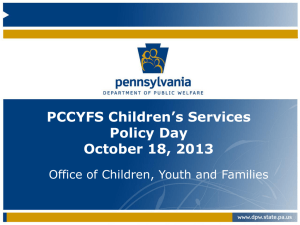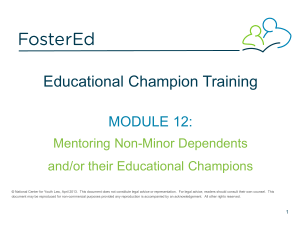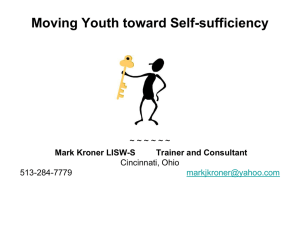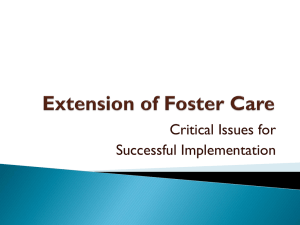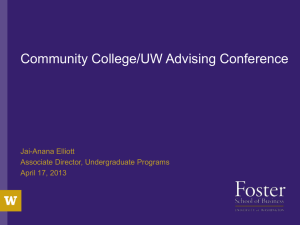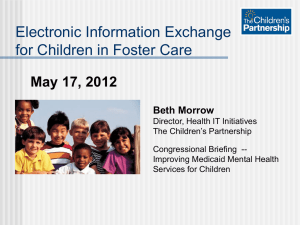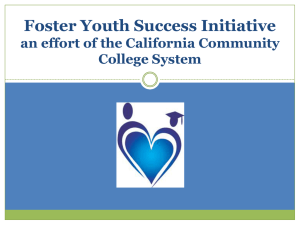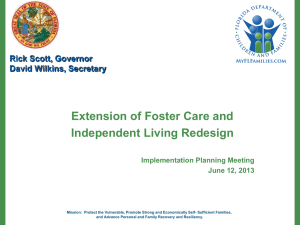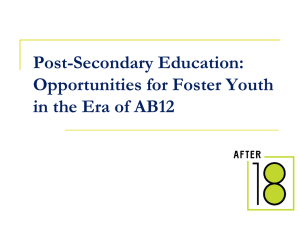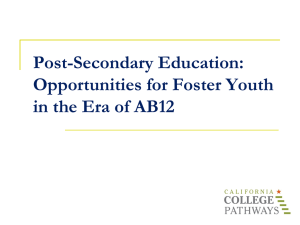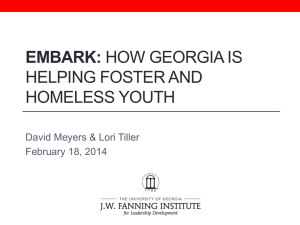Foster Care Provision Webinar 5-14-13
advertisement
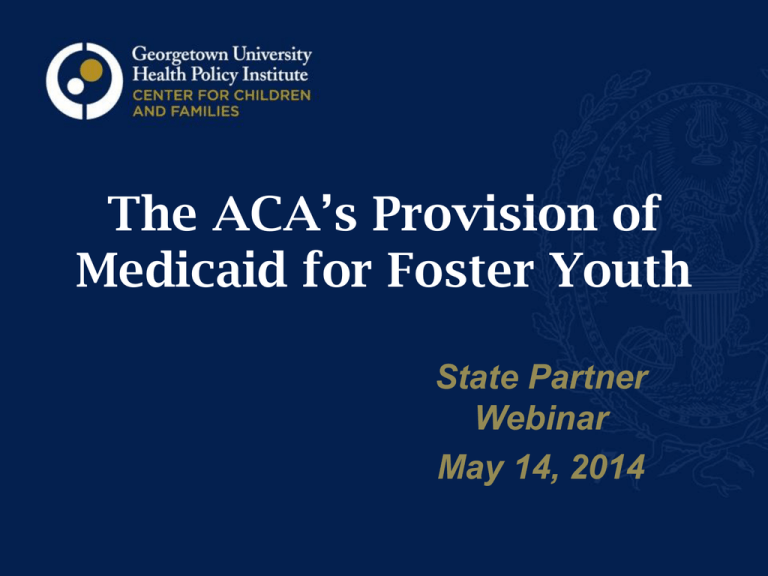
The ACA’s Provision of Medicaid for Foster Youth State Partner Webinar May 14, 2014 Our Guest Presenters Brooke Lehman Principal Childworks Bridget Walsh Leigh Cobb Senior Policy Associate Schuyler Center for Analysis and Advocacy New York Senior Health Policy Director Maryland Advocates for Children and Youth 2 Plain and Simple o The ACA extends Medicaid to all foster care youth under the age of 26 who: - Were in foster care at age 18, OR - Aged out of foster care (depending on the state’s upper age), AND - Were enrolled in Medicaid o Full EPSDT benefits to age 21 o Exempted from mandatory enrollment in an Alternative Benefit Plan 3 Awaiting Final Regulations o Proposed rules only require states to cover foster youth who were in foster care in their state o Option for states to cover youth who were in foster care in another state - Comments highlighted Congressional intent to cover all foster youth, regardless of state residence 4 Making the Case Why Foster Youth Need Medicaid Brooke Lehman 5 Health Needs of Foster Youth o In 2010 there were nearly 400,000 children and youth in foster care. o Often as the consequence of maltreatment, children and youth in foster care have high rates of acute and chronic medical, mental health and developmental problems. o Approximately 80 percent of children in foster care have a chronic medical condition, and 25 percent have three or more chronic health problems 6 Health Needs of Foster Youth o Children in foster care use mental health services, both inpatient and outpatient, at a rate 15-20 times higher than the general pediatric population. o Most frequently used Medicaid services include prescription drugs, rehabilitative services, inpatient psychiatric care, inpatient hospital care, and targeted case management 7 Implementation and Outreach: Suggestions for State Action o Collaboration between child welfare agency (CWA) and Medicaid to automate verification o Outreach from CWA to all former youth with instructions on how/where to apply o Include Medicaid coverage in transition plan and info sent to youth at transition o Engage alumni and organizations operating transition programs o Include foster youth provision in navigator/assister training 8 State Spotlight “New York” Bridget Walsh Promoting the Former Foster Care Provision of the ACA Schuyler Center for Analysis and Advocacy Statewide human services policy and advocacy organization in New York with a focus on children and families. Areas include: health, mental health, early care and education and child welfare. Work to build bridges across systems to improve outcomes for children and families. KidsWell partner and funding from the Robert Sterling Clark Foundation. Page 10 Activities to Date Submitted comments with recommendations on the proposed regulations to HHS. Sent recommendations to the NYS Department of Health and the Office of Children and Family Services. Engaged in conversations on policy options with NYS Agencies. Page 11 Activities to Date Developed and distributed an informational sheet. Engaged and educated fellow advocates working on ACA implementation. Community Service Society and Children’s Defense Fund NY Healthcare for All New York (HCFANY) and Medicaid Matters NY Presented at meetings and events. Page 12 Developing Partners Established diverse stakeholder workgroup with partners from: Health Mental Health Child Welfare Purpose of workgroup. Develop and distribute information to stakeholders. Explain why the provision is important to youth. Provide implementation recommendations. Page 13 Outreach ─ Community Communication Vehicles. Newsletter articles and flyers Webinars Topics. Raising awareness Updates on implementation Enrollment opportunities Other ideas. Conferences and training opportunities Outreach schedule for rollout May – December. Page 14 Outreach ─ Youth Youth in Progress (YIP). NYS Office of Children and Family Services. Organization of youth in care who work to improve the foster care system in New York. Variety of training and conference activities. Website, Facebook page, informational series. Other ideas. Videos Palm cards Next Steps – Working with the youth to develop ideas. Page 15 Next Steps Continue to provide recommendations on policy and implementation issues. Engage new partners. Explore other vehicles for outreach to both community partners and youth. More social media? Messages that resonate? Page 16 Page 17 Contact information: Bridget Walsh 518-463-1896, ext. 129 bwalsh@scaany.org www.scaany.org Questions on effective outreach and implementation and engaging state and community partners? Most Important Policy Decision: Cover Foster Youth from Other States How that conversation went in Maryland Leigh Cobb 2 0 Other Policy Options & Implications o Automated verification of eligibility o Presumptive eligibility o Retention o Need only confirm residency for renewal o Ensure consideration for ongoing coverage on 26th birthday o Watch for waivers of EPSDT for 19-20 yr olds 21 Final Questions and Wrap-Up 2 2 Georgetown Health Policy Institute Center for Children and Families • Tricia Brooks Research Assistant Professor – GU Health Policy Institute Senior Fellow – GU Center for Children and Families pab62@georgetown.edu 202-365-9148 • Our Website: http://ccf.georgetown.edu/ • Our child health policy blog: Say Ahhh!http://www.theccfblog.org/ • Our brief on the impact of the ACA on foster youth: http://ccf.georgetown.edu/all/aca-foster-care-youth-coveredtransition-adulthood/
